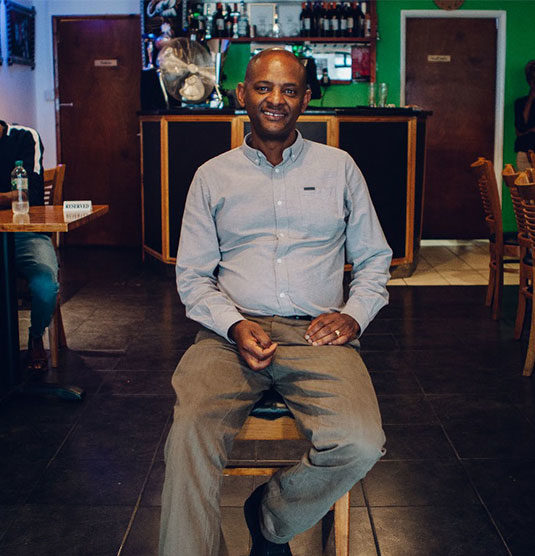What Ethiopian Cuisine Can Teach Us: YISHAK FANTU
This story has been brought to you by WorldRemit in partnership with Rootencial. Rootencial, founded by Josefina Bonsundy, is a start-up promoting diversity and inclusion, and as part of this it showcases positive stories of communities with African heritage, while contributing to their promotion and development.
Meet Yishak Fantu, an Ethiopian restauranteur based in London. From Ethiopia he embarked on a journey to the United Kingdom, where he has now spent almost two decades. For this interview, he speaks to us from his highly regarded restaurant located in Arsenal, London, where adventurous food lovers can enjoy a taste of Ethiopia.
Hi Yishak! Tell us about your journey, from where you started to where you are now?
I fled the situation in Ethiopia in 1999 and moved to the UK in 1999, where I applied for asylum.
Once I’d been granted the right to stay in the UK, I started studying. I completed a diploma and then graduated from Middlesex University, earning a bachelors degree in business management. I worked for a few years and then completed another qualification at University College London (UCL)’s Institute of Education.

After I finished up at UCL, however, I decided to go into business with my sister. In 2011, we opened Wolkite Kitfo, an Ethiopian restaurant in North London. Wolkite is the name of my home town in Ethiopia; kitfo is our speciality dish, beef. And also my favourite dish!
I was motivated by the chance to be my own boss, but also to expose my new home to some of my own Ethiopian culture.
What are some of the biggest challenges you’ve faced along the way? How did you overcome them?
It has not been hard to find good fresh ingredients to cook with in London. I’ve found almost everything here in this city. We only use fresh produce at the restaurant and we source many of our ingredients directly from Ethiopia.
One challenge has been the time it takes to prepare fresh Ethiopian cuisine. These days, people are used to making an order and the food arriving within a matter of minutes. It’s a broader social thing linked to instant gratification.
But given that we cook everything fresh at Wolkite Kitfo, you’re going to have to wait for maybe thirty minutes or more for the food to be ready, depending on what you order. There’s no way to speed up traditional Ethiopian cooking; you have to be patient.
I can understand why people want their food fast; maybe they’ve had a long and tiring day and they just want to eat. Although once the food arrives and they start eating, they always seem to forget about the time they were waiting for it anyway!
What can Ethiopian food teach us?
As described, Ethiopian food can teach us patience! But it can also teach us about respect and sharing.
In the UK and in many other societies, people are used to just ordering individual dishes for themselves when they go out to eat. But when they come to my restaurant and eat Ethiopian food, they must order a larger dish for a group to collectively share. This way, we can build more intimate relationships between people at Wolkite Kitfo! It’s great to share a dish.
Look at the way Ethiopian people eat, too. We mostly eat by hand. And we start off the meal by feeding each other by hand: it’s a sign of respect. If we sit down as friends or family to eat together, and my wife has done the cooking for example, I should feed her first from my own hands as a sign of respect and gratitude. I can’t just dive in myself; it wouldn’t be respectful.
What are you most proud of?
I love it when people come to my restaurant and then decide to travel and visit Ethiopia. That shows the power food can have: you try a new cuisine, and then feel like you need to explore the part of the world that it comes from! I’ve had large groups of people travel to Addis Ababa after eating at Wolkite Kitfo and that makes me extremely happy.
I’m proud of the quality and consistency of our food, and the recognition that we’ve received for being one of the finest African restaurants in the UK. For my sister and me, that’s a great honour.
Complete the following:
Be happy with what you are doing, who you are and what you are.
Colourful. Delicious. Unique
The celebration of Meskel, an annual religious holiday in Ethiopia where we celebrate the finding of the True Cross hundreds of years ago. People go to church, celebrate and eat together.
My family. I go back to Ethiopia once per year to visit my family members who are still there, including my parents, but it’s very hard for them to visit the UK. I miss Ethiopian family life.
If you tie up your belt too quickly, it will come loose.” It’s trying to teach us about the importance of patience.
Thanks to Wolkite Kifto Restaurant for sharing with us.
Visit them on their website at:
Comments are closed.